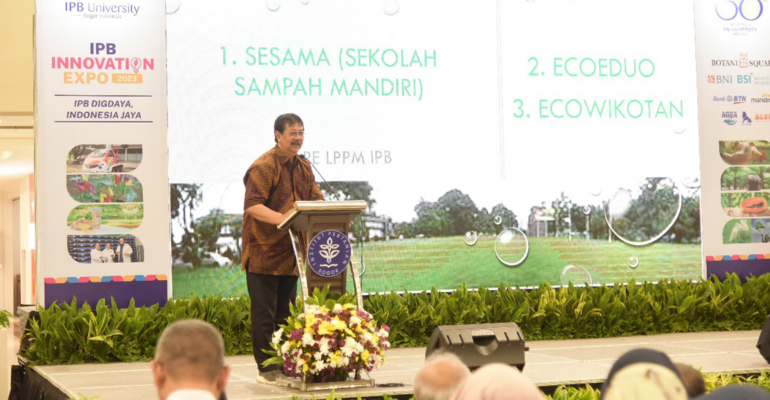SeSaMa: IPB University Innovation, Waste Management Solutions Starting from the Household

IPB University launched the Independent Waste School or ‘SeSaMa’ as a social innovation for community-based waste management. The main target of this program is to build community awareness and participation at the household level as a source of waste production.
SeSaMa has been pioneered by the Center for Alternative Dispute Resolutions, Regulation and Policy Analysis and Community Empowerment (CARE) since 2020. This innovation was born by Prof Sumardjo (Faculty of Human Ecology), Dr Agit Kriswantriyono (CARE), Prof Didik Suharjito (Faculty of Forestry and Environment), Dr Dahri Tanjung (Vocational School), and the CARE IPB University research team.
At the IPB Innovation Expo and Social Action Research Launching (29/9), Prof. Sumardjo said that the main SeSaMa curriculum includes environmental insight, independent waste management methods, alternative waste processing technology, introduction to biopori, maggot cultivation, institutional and organisational development, as well as marketing waste products.
“SeSaMa collaborates on socialisation activities, training, comparative studies, group initiation, mentoring and evaluation monitoring through competitions at the end of the program. This program also opens up opportunities for community partnerships with various parties in implementing activities and marketing the products produced. This is done in the context of “maintaining the sustainability of the program,” he said at the launch event at Botani Square, Bogor.
Prof Sumardjo added, “SeSaMa is expected to be a solution to reducing waste which has become a problem in various regions. “The success of waste reduction will really depend on public awareness as a source of waste production to participate in the waste management movement.”
Therefore, he said, building awareness and participation is an important key in the SeSaMa program. He hopes that this program will continue to spread to other areas so that more people are involved.
Dr Agit Kriswantriyono as one of the initiators of SeSaMa said that this program has succeeded in producing environmental cadres who are expected to become techno sociopreneur in waste management. Another result in Kebalen Village, Bekasi, West Java as a pilot project, was the ability to increase community participation there, consisting of 250 Neighborhood Associations (RT) and 29 Resident Associations (RW).
“During 2020-2023, the waste managed by the waste bank in Kebalen was more than 55.13 tons. “The circular economic value or waste bank income reached IDR 124,642,441,” he explained.
Apart from that, there are at least eight types of recycled products such as plastic bags, masks, compost fertiliser, liquid organic fertiliser (POC), moles, eco enzymes, maggots and plastic pots. There are also various processed food products from community gardens.
“Through this program, eight waste banks were formed. Currently, strengthening is continuing and is in the process of forming the Kebalen Waste Bank Association. “We also give appreciation through a cleanliness competition in Bekasi Regency,” he concluded. (*/Rz) (IAAS/AMR)



